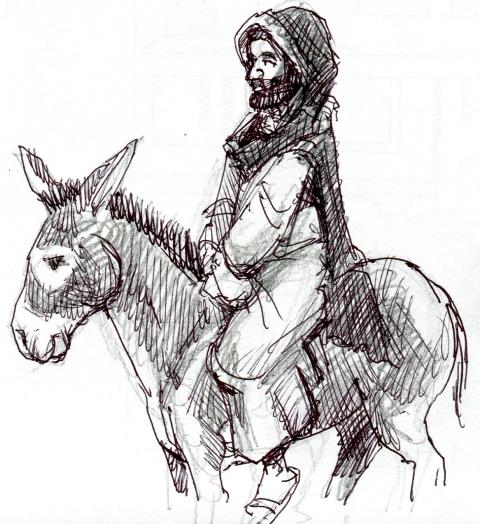
“He saved others; he cannot save himself” (Matt 27:33).
Palm/Passion Sunday
Mt 21:1-11; Is 50:4-7; Ps 22; Phil 2:6-11; Mt 26:14—27:66
The utter improbability of the Gospel is apparently something the early church was eager to proclaim. By worldly standards, the arrival of the Messiah, hailing from Nazareth in Galilee, riding into Jerusalem on an ass, was a perfect parody of royal and imperial power. Behold, the clown prince of Al Capp’s Dogpatch blowing into D.C. on a tractor to clean up the government and save the world.
Conquering kings and Roman generals marched into vanquished cities astride white stallions, trumpets blaring and banners waving. This was real power. Matthew instead fulfills prophecies from Isaiah and Zechariah that depict God’s servant coming in lowly estate, welcomed by the poor waving branches and spreading their cloaks on the road before him. These prophecies mocked imperial pretensions to real authority, which comes from God alone.
In yet another twist of this parody, Matthew subverts the crowd’s show of support for Jesus by contrasting it with the howling mob that just days later will reject him as messiah and call for his crucifixion.
With our own Palm Sunday, we begin with a ride on a donkey and then a roller coaster of high expectation and sudden collapse as Jesus’ ministry comes to an appalling end on Golgotha. The man on the donkey pays the ultimate price for his insolence and presumption. Son of God, indeed.
Indeed. Believers who re-enact Palm Sunday know that the story was written backwards in the light of the Resurrection. If Jesus is not risen from the dead, there is no story to tell, no Good News. So, our procession with palms and our participation in the reading of Matthew’s long Passion account today is a walk in faith, step by step, deeper and deeper into our own commitment to share in the mystery of the cross in order to know the meaning of the resurrection.
The Passion we read today is rich in details, beginning with Jesus’ agony in the garden, his betrayal by Judas, the flight of the disciples and the triple denial of Peter. Condemned by the Sanhedrin, Jesus is sent to Pilate, who fears being reported in Rome for freeing a rival to the emperor and trades “king” Jesus for Barabbas, a revolutionary, and sends Jesus to be flogged, mocked and crucified.
During a nightmare of reversals and broken dreams, only the women remain faithful, and they alone keep watch during the silent interval after Jesus’ death and rushed burial. From their dark night will rise up the first glimpse of faith on Easter morning. Even then, the 11 remaining Apostles, in hiding, will be slow to understand what has happened.
Palm/Passion Sunday is unique in that all of us assembled to mark the start of Holy Week will be invited to share in the dramatic reading of the Passion. As participants, we are challenged to cross the threshold of faith to accept the pattern of Jesus’ life, death and resurrection in our lives. Only by uniting ourselves, mind, heart, soul and strength with Jesus, will we begin to be true disciples. The memory of Jesus’ Passion is a living call to follow him in our own time, whatever the cost.
We commemorate the Passion of Jesus in order to take up his redemptive mission in our own time and place. He revealed God’s way of drawing history toward the Beloved Community of justice and love. This is how we will enter into that difficult process, but it is the only road to Easter.





